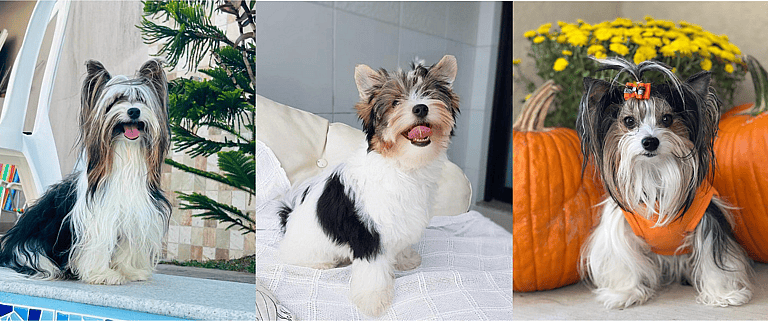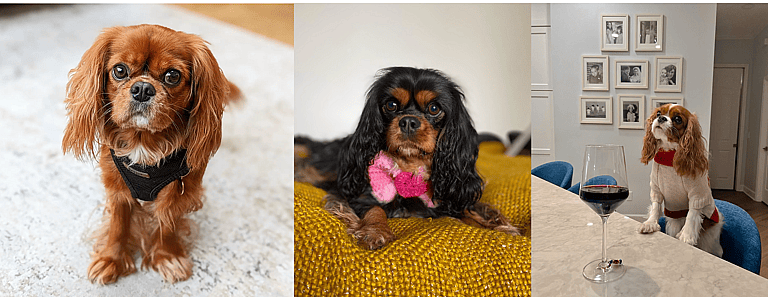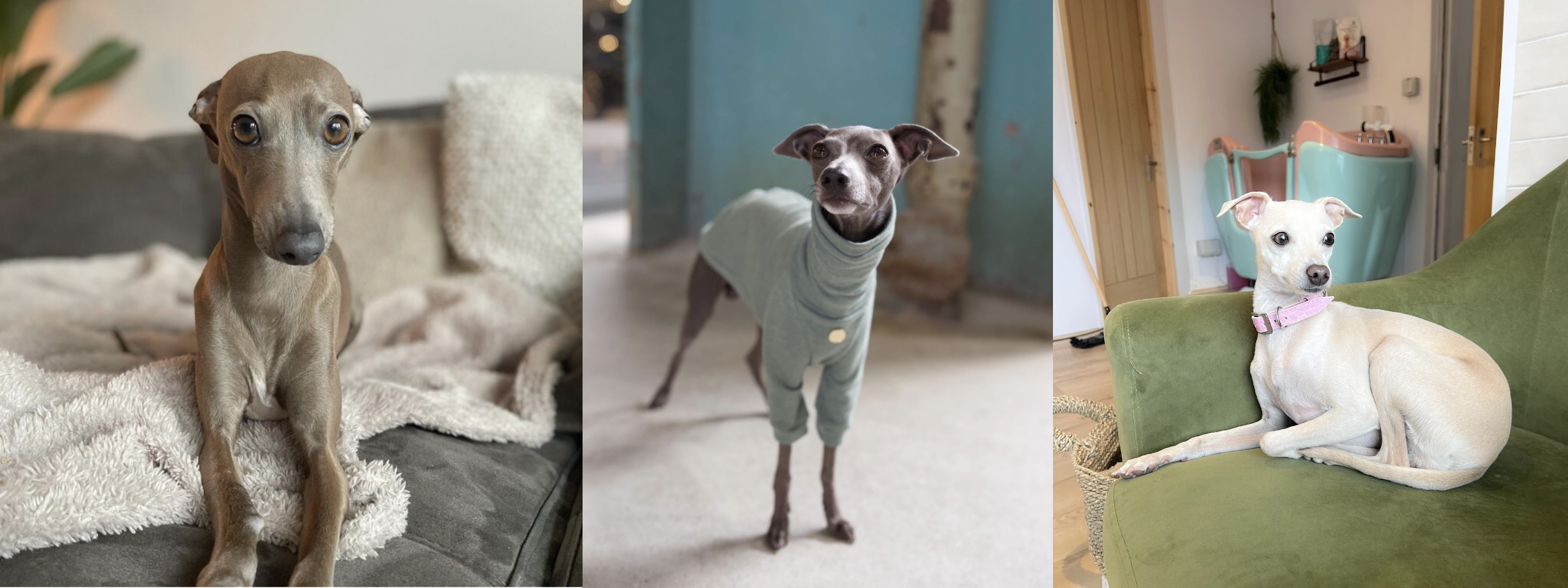The #1 Best Dog for Apartment Living, According to Top-Rated Trainers
Some dog breeds need a lot of room—a big house, a big yard, and plenty of space to exert energy. Other dogs are perfectly happy living in smaller spaces like apartments, and a good vigorous walk every day is plenty of exercise for their energy needs.

When you consult a dog trainer or canine behavioral expert on the best dog breeds for apartments, they’ll ask you to consider four very basic points:
- How big is the dog? Will it be easy to find an apartment building that allows dogs of that size?
- How much energy does the dog have? Does this dog breed need to run, or are they more of a couch potato?
- How much does this dog breed bark? Is it a quiet breed, or will you need to be concerned about noise complaints from neighbors?
- How trainable is this dog breed? Dogs in apartment buildings need to be well-behaved and under owner control at all times—will this dog breed adapt well to routines and rules?
Of the hundreds of dog breeds in the world, we’ve narrowed it down to a dozen of the best dogs for apartments recommended by dog trainers like Russell Hartstein (in an interview with ApartmentTherapy.com), Stephanie Bennett (in an interview with Click2Houston), Garret Wing (who we’ll cover a little more in just a moment) and many others. You’ll need to read until the end to find out what the #1 best apartment dog is, but you’re also certain to discover breeds you might not have considered for your small space lifestyle.
12. Basset Hound

Basset Hound Quick Facts:
- Size: Medium/Large (15 inches or less — 40-65 pounds)
- Energy Level: 2/5 — Low energy
- Barking: 4/5 — Loves to talk
- Trainability: 3/5 — Sometimes stubborn
Often slow-moving and tough to wake up in the morning, the Basset Hound loves a life of leisure and doesn’t demand much space as long as it has a soft bed. The one downside of Basset Hounds as apartment dogs is their love of barking—Bassets are vocal, but you can easily work with your pooch to teach them to use their inside voice.
11. Bedlington Terrier

Bedlington Terrier Quick Facts:
- Size: Small/Medium (15-17.5 inches tall — 17-23 pounds)
- Energy Level: 4/5 — Moderately high energy
- Barking: 3/5 — Barks occasionally
- Trainability: 3/5 — Sometimes Stubborn
Bedlington Terriers do very well in small spaces like apartments as long as they also get plenty of exercise. If you are an especially active person and are willing/able to bring your dog to parks to run, on long hikes, or involve them in canine sports, the Bedlington could be for you!
10. Bichon Frise

Bichon Frise Quick Facts:
- Size: Small (9.5-11.5 inches — 12-18 pounds)
- Energy Level: 4/5 — Moderately high energy
- Barking: 3/5 — Barks occasionally
- Trainability: 4/5 — Quick learner
These sweet, curious little dogs are alert and a little more vocal and a little more high energy than the ideal apartment dog—but they make up for it with their excellent manners! The Bichon Frise is quick to pick up on rules and super eager to please, and with enough mental stimulation they live well in small spaces.
9. Biewer Terrier

Biewer Terrier Quick Facts:
- Size: Toy (7-11 inches tall — 4-8 pounds)
- Energy Level: 3/5 — Average energy
- Barking: 3/5 — Barks occasionally
- Trainability: 3/5 — Sometimes stubborn
Pronounced “Beaver Terrier,” this widely unknown dog is goofy, and fun-loving, but relatively low energy, especially for a terrier. A unique, extremely small breed, the Biewer Terrier enjoys playing, going for walks, and light exercise, but won’t be demanding hours of running or strenuous activity.
8. Greyhound

Greyhound Quick Facts:
- Size: Large (27-30 inches tall — 60-70 pounds)
- Energy Level: 2/5 — Low energy
- Barking: 3/5 — Barks occasionally
- Trainability: 3/5 — Sometimes stubborn
Yes, big dogs can be apartment-friendly, too! Nicknamed 40-mile-per-hour Couch Potatoes, Greyhounds defy their racing history by preferring to lounge on a soft surface over any other activity. Gentle and reserved, Greyhounds are the perfect large apartment dog.
7. American Eskimo Dog

American Eskimo Dog Quick Facts:
- Size: Toy, Small, Medium
- Energy Level: 4/5 — Moderately high energy
- Barking: 3/5 — Barks occasionally
- Trainability: 4/5 — Quick learner
American Eskimo Dogs, but all of them are under 35 pounds and great apartment dogs! Loyal and intelligent American Eskimo Dogs like light exercise and outdoor activities but don’t need hours of exercise a day. The three sizes of American Eskimo Dog are Toy, Miniature, and Standard. Here’s how big you can expect each variety to be as an adult:
- Toy American Eskimo Dog: 9-12 inches tall — 6-10 pounds
- Miniature American Eskimo Dog: 12-15 inches tall — 10-20 pounds
- Standard American Eskimo Dog: 15-19 inches tall — 25-35 pounds
6. Maltese

Maltese Quick Facts:
- Size: Toy (7-9 inches tall — 7 pounds or less)
- Energy Level: 3/5 — Average energy
- Barking: 3/5 — Barks occasionally
- Trainability: 3/5 — Sometimes stubborn
If small size is the most important factor for your apartment lifestyle, you can’t get much smaller than the Maltese! These teeny tiny friendly dogs are playful and have moderate energy levels, but they’re far more interested in mental stimulation than physical exercise. Cheerful and social but very gentle and non-reactive, Maltese also do well in buildings with lots of people and other dogs.
5. Cavalier King Charles Spaniel

Cavalier King Charles Spaniel Quick Facts:
- Size: Toy (12-13 inches tall —13-18 pounds)
- Energy Level: 3/5 — Average energy
- Barking: 3/5 — Barks occasionally
- Trainability: 4/5 — Quick learner
The Cavalier King Charles Spaniel is one of the best dog breeds for seniors thanks to their gentle nature, bright intellect, and calm personality. These qualities also make them good apartment dogs, and they’re mentioned by most trainers and behavior experts when recommending breeds for small living.
4. French Bulldog

French Bulldog Quick Facts:
- Size: Small (11-13 inches tall — 28 pounds or less)
- Energy Level: 3/5 — Average energy
- Barking: 2/5 — Rarely barks
- Trainability: 4/5 — Quick learner
French Bulldogs recently earned their crown as the most popular dog breed in the United States, and this likely has a little something to do with apartment dwellers. Great apartment dogs with relatively low space and exercise needs, French Bulldogs are also one of the few “bully breeds” regularly allowed by rental companies, landlords, and HOAs.
3. Italian Greyhound

Italian Greyhound Quick Facts:
- Size: Toy (13-15 inches tall — 7-14 pounds)
- Energy Level: 3/5 — Average energy
- Barking: 3/5 — Barks occasionally
- Trainability: 4/5 — Quick learner
The tiny version of the majestic race dogs the Italian Greyhound is one of the best small dogs for apartments! Sometimes described as cat-like, Italian Greyhounds are typically quiet little dogs who love to find the warmest place in your home and nap there all day. The American Kennel Club describes Italian Greyhounds as “decorative couch dogs,” and while they do enjoy playing and might experience occasional bursts of zoomies, the IG loves to lounge.
2. Shih Tzu

Shih Tzu Quick Facts:
- Size: Toy (9-10.5 inches tall — 9-16 pounds)
- Energy Level: 3/5 — Average energy
- Barking: 3/5 — Barks occasionally
- Trainability: 4/5 — Quick learner
The Shih Tzu almost placed first on our list of the best apartment dogs because trainers almost always mention this breed. Cheerful, easy to train, good with other dogs, and relatively low energy, Shih Tzus adapt very well to life in small spaces. Because they are so social, Shih Tzus do very well at community potty spots and rooftop dog runs.
Shih Tzus are usually very quick to learn new routines and training, but there is one common complaint about the breed: potty training. Luckily, if you live in an apartment, you can easily teach a Shih Tzu to use a puppy pad or indoor potty spot.
1. Pug

Pug Quick Facts:
- Size: Toy (10-13 inches tall — 14-18 pounds)
- Energy Level: 3/5 — Average energy
- Barking: 2/5 — Rarely barks
- Trainability: 4/5 — Quick learner
Our number one pick for the all-around best apartment dog is the Pug! Trainers like those mentioned above also recommend pugs, but one viral video really has us convinced. In a TikTok video that now has more than 32K likes, dog trainer Garret Wing shares why Pugs make the best dogs for an apartment: “It’s small, it’s friendly, and it doesn’t bark a lot, and it does not require a lot of exercise which makes it great for living in an apartment.”
Not only do Pugs not need very much exercise, but strenuous exercise can actually be harmful to your Pug. Thanks to their flat faces, many Pugs have difficulty breathing and can have bad reactions to exercise. Life in an apartment usually doesn’t offer much opportunity for long runs or overexertion—and Pugs like the easy life!
Frequently Asked Questions About Dog Breeds and Apartment Living
Are Corgis Good Apartment Dogs?
Yes, Corgis can be great apartment dogs. They adapt well to living in smaller spaces but need regular walks and mental stimulation. Their size and energy level make them suitable for apartment living, as long as they get enough exercise.
Are Great Danes Good Apartment Dogs?
Surprisingly, Great Danes can be good for apartments. Despite their size, they are relatively low-energy dogs. However, their large size requires adequate space inside the apartment, and they need daily walks to stay healthy.
Are Beagles Good Apartment Dogs?
Beagles can adapt to apartment living if they receive sufficient exercise. They are energetic and require regular walks and playtime. Be aware of their tendency to bark, which might be an issue in an apartment setting.
Are Golden Retrievers Good Apartment Dogs?
Golden Retrievers can live in apartments, but they are high-energy dogs that require a lot of exercises. Daily long walks and playtime are essential for their well-being in an apartment setting.
Are Labs Good Apartment Dogs?
Labrador Retrievers can be good apartment dogs if they receive enough exercise. They are energetic and need plenty of walks and playtime. Their friendly nature makes them adaptable to various living situations.
Are Welsh Corgis Good Apartment Dogs?
Welsh Corgis are suitable for apartment living, similar to Corgis. They are small, but active, requiring regular exercise and mental stimulation to stay happy in an apartment environment.
Are Dachshunds Good Apartment Dogs?
Dachshunds are excellent apartment dogs due to their small size. They do need regular walks and playtime, but they adapt well to indoor living. Crate training can help with house training and managing their energy.
Are Labradors Good Apartment Dogs?
Labradors, like Labrador Retrievers, can adapt to apartment living if their exercise needs are met. They need daily walks and playtime, and their friendly disposition makes them a good fit for family living in apartments.
Are Greyhounds Good Apartment Dogs?
Greyhounds are surprisingly good for apartments. They are known for being couch potatoes indoors despite their speed. Regular walks are essential, but they don’t require extensive exercise.
Are Beagles Good Dogs for Apartments?
Beagles can live in apartments but need ample exercise and mental stimulation. They tend to bark, which might be a concern for neighbors, but regular walks and play can help manage their energy.
Are Basset Hounds Good Apartment Dogs?
Beagles can live in apartments but need ample exercise and mental stimulation. They tend to bark, which might be a concern for neighbors, but regular walks and play can help manage their energy.
Are Dobermans Good Apartment Dogs?
Dobermans can live in apartments if they receive enough exercise. They are energetic and need regular, vigorous exercise and mental stimulation to be happy in a smaller space.
Are Rottweilers Good Apartment Dogs?
Rottweilers can adapt to apartment living but require a lot of exercises and mental engagement. They need space and should be regularly walked and trained to live happily in an apartment.
Are Shibas Good Apartment Dogs?
Shibas can be good apartment dogs. They are relatively independent and not overly energetic, but they need regular walks and mental stimulation to prevent boredom.
Are Pitbulls Good Apartment Dogs?
Pitbulls can be good apartment dogs if they are given adequate exercise and training. They are energetic and need daily walks and playtime, along with consistent training for good behavior.
Are Goldendoodles Good Apartment Dogs?
Goldendoodles can live in apartments, but their exercise requirements are high. They need long walks and playtime every day to stay healthy and happy in an apartment setting.
Are Huskies Good Apartment Dogs?
Huskies are not typically recommended for apartments due to their high energy and need for extensive exercise. They can adapt if given ample outdoor time and mental stimulation but generally prefer more space.
Are Pugs Good Apartment Dogs?
Pugs are excellent for apartments. Their small size and lower energy levels make them well-suited to indoor living. Regular short walks and play sessions are enough for their exercise needs.
Are Poodles Good Apartment Dogs?
Poodles can be good in apartments. They are intelligent and adaptable, requiring regular exercise and mental stimulation. Their size varies, so space needs might differ based on whether they are Standard
Are Yorkies Good Apartment Dogs?
Yes, Yorkshire Terriers (Yorkies) are excellent for apartment living. They are small in size and generally have a moderate energy level, making them well-suited for smaller spaces. Regular walks and playtime are sufficient for their exercise needs.
Are Pomeranians Good Apartment Dogs?
Pomeranians are very suitable for apartment living due to their small size and manageable energy levels. They do require regular exercise and mental stimulation, but their size makes them a great fit for apartment dwellers.
Are Boston Terriers Good Apartment Dogs?
Boston Terriers are great choices for apartment living. They are small, relatively easy to train, and adapt well to indoor environments. While they are energetic, their exercise needs can be met with regular walks and play sessions.
Are Cocker Spaniels Good Apartment Dogs?
Cocker Spaniels can adapt to apartment living, but they have moderate energy levels that require regular exercise. Daily walks and playtime are important for their well-being. Their friendly nature and trainability make them a good choice for apartment dwellers who can provide them with sufficient exercise and mental stimulation.



